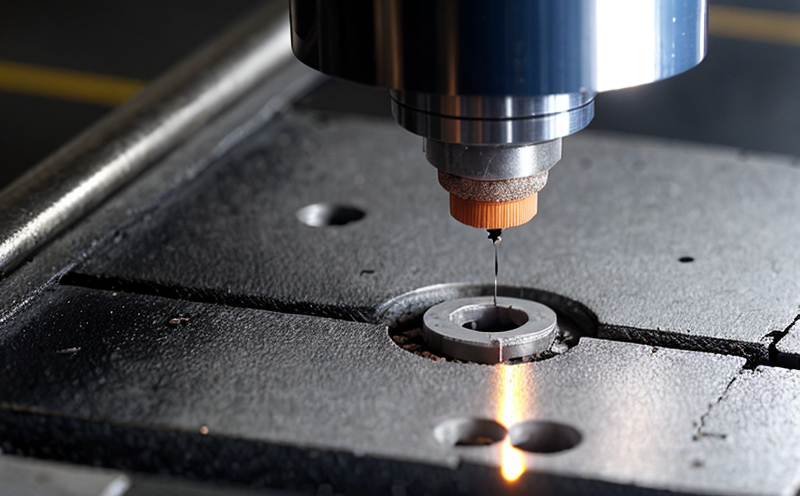IEC 60749-14 Mechanical Defect Characterization Testing
The IEC 60749-14 standard is a critical cornerstone in the field of semiconductor and microchip testing, specifically focusing on mechanical defect characterization. This service is essential for ensuring that semiconductors and microchips meet stringent quality and safety standards throughout their lifecycle, from initial design to final product deployment.
Developed by the International Electrotechnical Commission (IEC), IEC 60749-14 provides a comprehensive framework for identifying mechanical defects in semiconductor devices. These defects can significantly impact device performance, reliability, and safety. By leveraging this standard, manufacturers can achieve higher levels of quality assurance and compliance with international regulations.
The testing process under IEC 60749-14 involves several key steps, including sample preparation, mechanical stress application, observation using advanced microscopy techniques, and detailed analysis to identify any defects. The methodology is designed to be robust yet flexible enough to accommodate various types of semiconductor devices. This ensures that the test results are reliable and repeatable, providing confidence in the integrity of the tested components.
One of the primary focuses of this testing service is on identifying defects caused by mechanical stress. These stresses can arise from manufacturing processes or operational conditions. By detecting these defects early in the development cycle, manufacturers can address potential issues before they lead to costly failures in end products. This proactive approach not only enhances product quality but also improves overall customer satisfaction.
Another critical aspect of IEC 60749-14 testing is its ability to characterize defects accurately. Advanced imaging technologies and sophisticated analytical tools are used to provide detailed insights into the nature and extent of any detected defects. This level of precision ensures that only genuine issues are identified, minimizing false positives and reducing unnecessary rework.
The standard's emphasis on repeatability and reproducibility further strengthens its value proposition for quality assurance teams. Consistent test results across different batches or production runs help maintain the integrity and consistency of semiconductor products. This is particularly important in industries where reliability and performance are paramount, such as automotive electronics, aerospace, and telecommunications.
IEC 60749-14 also plays a crucial role in ensuring compliance with international standards and regulations. By adhering to this standard, manufacturers can demonstrate their commitment to high-quality products and adherence to global best practices. This is especially relevant for companies operating in highly regulated markets or exporting to countries that have stringent quality requirements.
In summary, IEC 60749-14 Mechanical Defect Characterization Testing is a vital service for semiconductor manufacturers seeking to enhance product reliability and safety. By employing this standard, they can achieve greater confidence in their testing processes while ensuring compliance with international standards. This not only contributes to improved product quality but also fosters trust among customers and stakeholders.
Scope and Methodology
The scope of IEC 60749-14 Mechanical Defect Characterization Testing covers the identification, characterization, and documentation of mechanical defects in semiconductor devices. This includes defects caused by physical stresses during manufacturing or operational conditions.
- Sample Preparation: The process begins with thorough preparation of the samples to ensure they are representative of the production run.
- Mechanical Stress Application: Various methods are used to apply controlled mechanical stress, simulating real-world conditions.
- Observation Techniques: High-resolution microscopy and other advanced imaging techniques are employed to capture detailed images of the samples.
- Data Analysis: Comprehensive analysis is conducted to identify and characterize any defects observed.
The methodology ensures that all tests are conducted in a standardized manner, providing consistent and reliable results. This is crucial for maintaining quality standards throughout the manufacturing process.
Benefits
- Enhanced Product Quality: By identifying defects early, manufacturers can improve product reliability and performance.
- Compliance with Standards: Adherence to international standards ensures compliance with global regulations and best practices.
- Cost Savings: Early detection of defects reduces the need for costly rework and repair processes later in the production cycle.
- Increased Customer Satisfaction: Reliable products lead to higher customer satisfaction, fostering long-term relationships.
The detailed insights provided by this testing service also enable manufacturers to make informed decisions about process improvements and design optimizations. This ultimately leads to more efficient operations and better-performing products.
Industry Applications
- Aerospace: Ensuring the reliability of electronic components used in space missions and aircraft systems.
- Automotive Electronics: Testing semiconductors for use in automotive applications, where safety is paramount.
- Telecommunications: Verifying the durability and performance of microchips used in communication devices.
- Medical Devices: Ensuring the integrity of electronic components used in medical equipment to ensure patient safety.
In each of these industries, IEC 60749-14 Mechanical Defect Characterization Testing plays a crucial role in maintaining high-quality standards and ensuring compliance with international regulations. This service is particularly valuable for companies operating in sectors where reliability and performance are critical factors.





